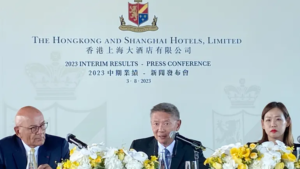
Peninsula Hotels’ Myanmar project to resume depending on economics
Recovery of tourist travel to China slowed by ‘geopolitical tensions’
The operator of the luxury The Peninsula Hotels chain said Thursday that its stalled $130 million project in Myanmar has not been canceled and that a decision to resume it would depend on economic conditions.
The new hotel construction project in Yangon has been halted since June 2021, after the country’s military toppled the democratically elected government in February of that year.
“At the moment, our project is on hold,” Clement Kwok, CEO of Hongkong and Shanghai Hotels, told reporters on Thursday at a midyear earnings news conference.
Though the suspension has now extended over two years, he said “the plan is certainly not to give it up. We still hold the land lease.”
“This project has not been canceled by any means,” Kwok said.
The Yangon hotel project is a joint venture with two companies controlled by Myanmar tycoon Serge Pun’s Yoma Group: Singapore-listed Yoma Strategic Holdings and Yangon-listed First Myanmar Investment. Hongkong and Shanghai Hotels owns 70%, while Yoma holds the rest.
The planned 88-room hotel is part of a redevelopment of the former colonial-style Myanmar Railway headquarters in the heart of country’s old capital. The project kicked off in 2014 and was supposed to have been completed last year. But as construction stopped, Hongkong and Shanghai Hotels recorded an impairment charge of 679 million Hong Kong dollars ($87.1 million at current rates), or 85% of the project’s book value, at the end of 2021.
Asked about what is needed for the project to resume, Kwok said “it would be an assessment of the economics.” He noted signs that Myanmar’s economy is “regaining some normality,” citing local property transactions being made by partner Yoma.
However, he drew a line between what he saw on the ground and the “business prospect of an international luxury hotel.” He said that outlook, including a return of foreign tourists, was not in sight under the current circumstances.

Myanmar’s military government on Monday extended a state of emergency for another six months, the fourth time since its February 2021 takeover.
The military has cited resistance by armed militants to justify the prolonged state of emergency. Had the state of emergency been lifted, the constitution would require a general election within six months.
The declaration grants Senior Gen. Min Aung Hlaing, commander in chief of the armed forces, the legal basis for exercising full legislative, executive and judicial powers. Min Aung Hlaing said “restoring stability and the rule of law is necessary for holding a general election nationwide.”
Apart from the stalled Myanmar project, business is gradually returning to normal for Hongkong and Shanghai Hotels. The newly completed The Peninsula Istanbul opened in February, while the company’s London hotel and apartment complex is now set to start operation in September.
Revenue for the first six months of 2023 increased by 47% on the year to HK$2.44 billion. Earnings before interest, taxes, depreciation and amortization (EBITDA) grew 457% to HK$362 million.
Kwok called the results a “strong rebound” from the same period last year under COVID restrictions. But he said that business, particularly in Hong Kong, Shanghai and Beijing, is “still affected by geopolitical tensions.”
Though business travelers from the U.S. are back, American and European long-haul tourists to mainland China and to a certain extent to Hong Kong have not returned, Kwok said. Peter Borer, the chief operating officer, told the news conference that “given the geopolitical concerns and limited flight capacity, very few leisure travelers came to Beijing.”
The Peninsula Tokyo seems to be a beneficiary of that tension, as it had “a very strong first-half result, exceeding expectations,” thanks to a return of travelers mainly from the U.S., U.K. and Hong Kong, according to Borer. The month of April, during the cherry blossom season, produced the hotel’s highest-ever revenue since its opening in 2007.
Source: https://asia.nikkei.com/Business/Companies/Peninsula-Hotels-Myanmar-project-to-resume-depending-on-economics-CEO

